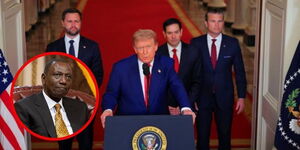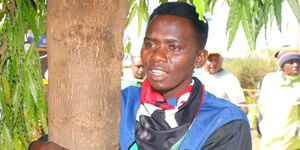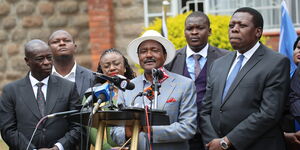The High Court has issued a conservatory order stopping the implementation of President William Ruto's decision to form a multi-agency team on the war against graft.
Justice Bahati Mwamuye, on Wednesday, August 20, morning, temporarily halted the implementation of Ruto's proclamation pending the hearing and determination of the matter.
"Pending the inter partes hearing and determination of the applicants' notice of motion, a conservatory order be and is hereby issued staying the operation and implementation of the Presidential Proclamation on the Establishment of the Multi-Agency Team on War Against Graft," Justice Mwamuye ruled.
Following the ruling, the court directed the petitioners to immediately serve the respondents with the application in both hardcopy and softcopy by Thursday, August 21, 2025.
According to Justice Mwamuye, the respondents and the interested parties have until August 29, 2025, to file their responses in regards to the matters raised in the application.
"The petitioners shall have leave to file and serve a rejoinder if need be, and they shall do so by close of business September 5, 2025," the court further directed.
"At the mention of the matter, and in addition to confirming compliance, parties and counsel shall address the court on their respective proposals for the expedited bearing and determination of the matter within 90 days," Mwamuye added.
The conservatory order emanates from a petition filed by Magare Gikenyi alongside three other complainants. In their petition, the applicants argued that Ruto's proclamation violated several articles of the Constitution.
In particular, the petitioners argued that the Head of State lacked the constitutional provision to form an anti-graft task force, with the petitioners further claiming that Ruto overreached EACC's mandate.
The petitioners went ahead to term Ruto's formation of the multi-agency team as 'imaginary hot air mirage powers', claiming that the Constitution was clear on the limits of the executive's powers.
Additionally, the petition also criticises the inclusion of other autonomous institutions such as the Central Bank of Kenya (CBK), the Office of the Director of Public Prosecution (ODPP) and the National Intelligence Service (NIS).
They also raised concerns over the funding of the multi-agency team, claiming that it was clear the government intended to finance the team with taxpayers' money.












